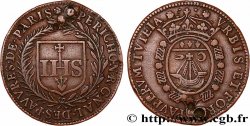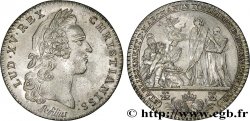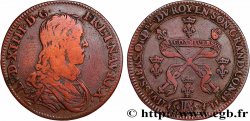fjt_361188 - CORPORATIONS Jeton AR 31 1780
Not available.
Item sold on our e-shop (2018)
Price : 250.00 €
Item sold on our e-shop (2018)
Price : 250.00 €
Type : Jeton AR 31
Date: 1780
Metal : silver
Diameter : 31 mm
Orientation dies : 6 h.
Weight : 9,62 g.
Edge : cannelée
Rarity : R2
Coments on the condition:
Qualité extraordinaire pour ce rare jeton qui n’a pas circulé et présente encore les traces de polissage du coin. Le revers présente une remarquables patine de médaillier
Catalogue references :
Obverse
Obverse legend : LUD. XVI. REX CHRISTIANISS..
Obverse description : Buste à droite de Louis XVI signé MONIÉ. [Feuardent n° 384].
Obverse translation : (Louis XVI, roi très chrétien).
Reverse
Reverse legend : .VINCIT. CONCORDIA. FRATRVM..
Reverse description : Hercule assis à droite sur la peau de lion de Némée essaie de rompre un faisceau. Devant lui, les colonnes d’Hercule ; derrière, une colonne ; à l'exergue en trois lignes : LES. SIX. CORPS. DES. / .MARCHANDS. /.1780..
Reverse translation : (La concorde entre frères est victorieuse).
Commentary
Buste rarissime. Ce type de revers symbolisant l'Unité sera repris pour la fabrication des monnerons révolutionnaires.








 Report a mistake
Report a mistake Print the page
Print the page Share my selection
Share my selection Ask a question
Ask a question Consign / sell
Consign / sell
 Full data
Full data



